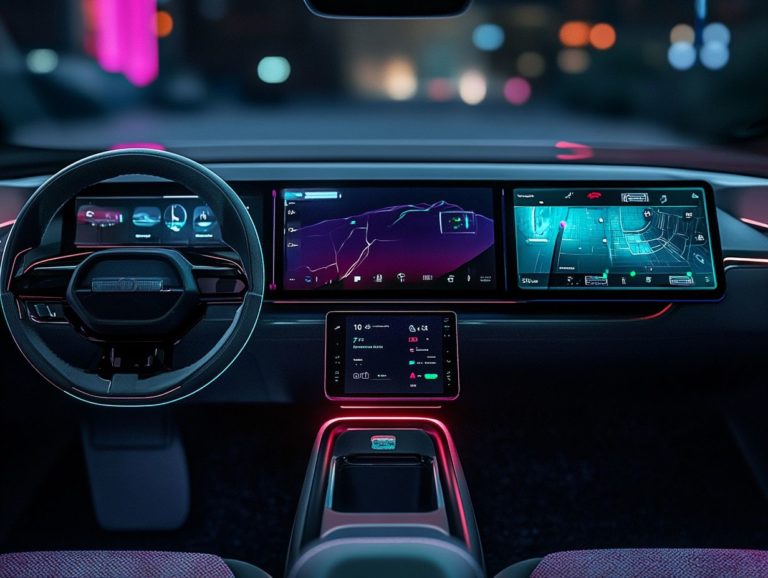Understanding Feature Differences in Electric Models
Electric models are revolutionizing transportation, providing eco-friendly alternatives to conventional vehicles.
With a range of options, including plug-in hybrids and fully electric cars, selecting the right model can feel daunting.
This article distills the essential features of electric vehicles, covering battery life, charging times, range, and performance. It also dispels common misconceptions that may be keeping you from making the switch.
By the time you finish reading, you ll have a clearer grasp of which electric vehicle aligns perfectly with your lifestyle and needs.
Contents
- Key Takeaways:
- What are Electric Models?
- Types of Electric Models
- Features of Electric Models
- Choosing the Right Electric Model for You
- Common Misconceptions about Electric Models
- Frequently Asked Questions
- What are electric models?
- What are the differences between electric models?
- How do I understand the feature differences in electric models?
- Do all electric models have the same range and charging time?
- What are the benefits of choosing an electric model over a traditional gasoline vehicle?
- Are there any downsides to choosing an electric model?
Key Takeaways:
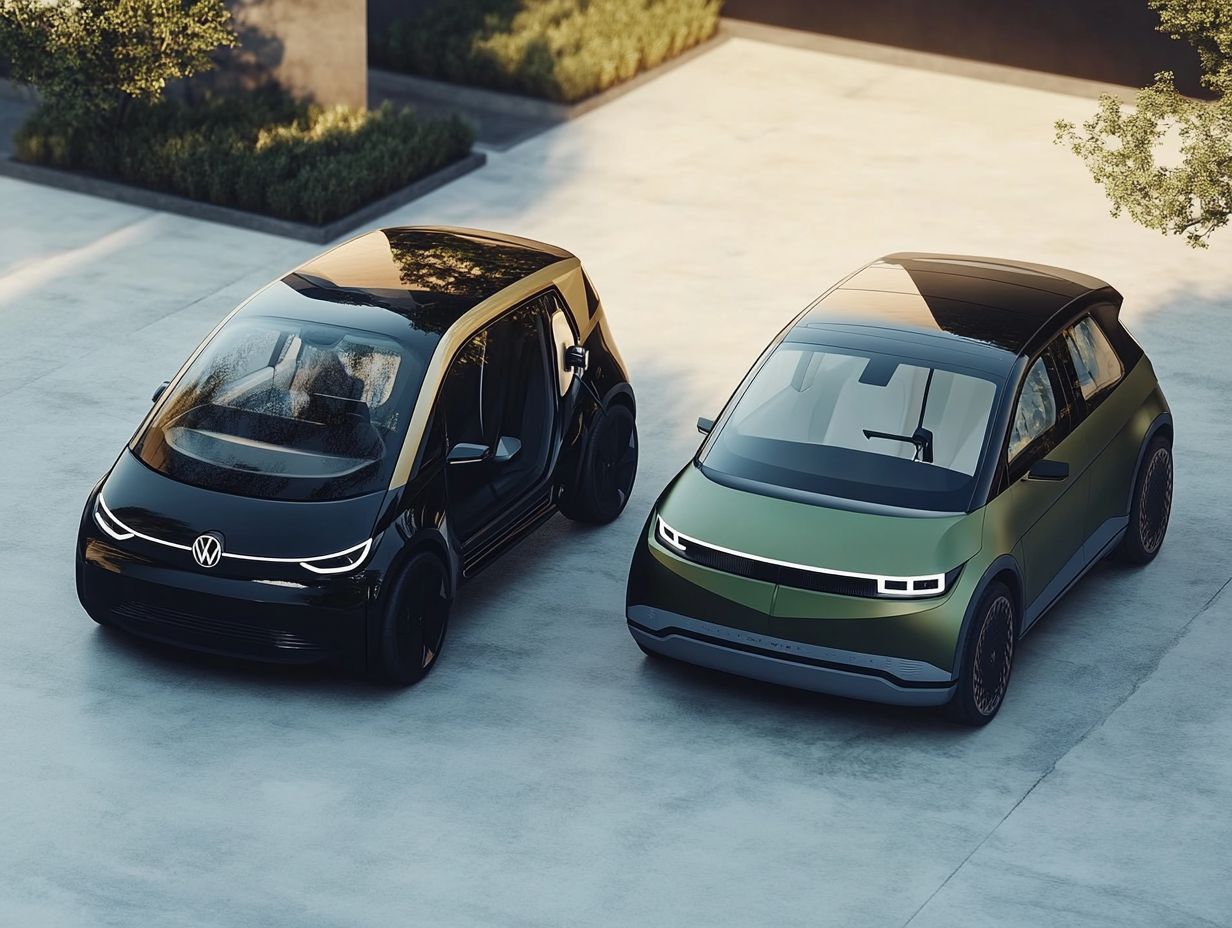
- Electric models include plug-in hybrids and fully electric cars, each with unique features and benefits.
- Important factors to consider when choosing an electric model are battery life, charging time, range, performance, cost, and maintenance.
- When deciding on the right electric model, consider your lifestyle and needs, and debunk common misconceptions about electric cars.
What are Electric Models?
Electric models represent a new evolution in the automotive industry, relying primarily on electricity instead of traditional fossil fuels. This shift is reshaping transportation while significantly curbing CO2 emissions.
Among these innovations, Battery Electric Vehicles (cars that run only on electricity) and Plug-in Hybrid Electric Vehicles (which use both electric power and gasoline) emerge as key categories. With President Biden’s push to bolster charging infrastructure across North America, electric vehicles are becoming increasingly accessible.
This development is prompting car dealerships to adapt their inventories, aligning with consumer preferences for greener alternatives.
Types of Electric Models
The realm of electric vehicles presents a diverse array of options, including Battery Electric Vehicles, Plug-in Hybrid Electric Vehicles, and hybrid electric vehicles. Each type is designed with unique features to cater to your specific driving needs, ensuring you find the perfect fit for your lifestyle.
Plug-in vs. Hybrid vs. Electric
When you compare plug-in and hybrid electric vehicles, it s crucial to grasp the distinctions in technology and functionality. Battery Electric Vehicles run exclusively on electric power, while Plug-in Hybrid Electric Vehicles combine both electric and gasoline engines. This duality not only optimizes performance but also aims to minimize your carbon footprint.
By understanding these differences, you can see how each type of vehicle plays a role in reducing emissions and tackling energy consumption challenges. For example, PHEVs provide the flexibility of an extended driving range, thanks to their gasoline support. This feature alleviates the common worry of running out of charge, often referred to as range anxiety.
On the flip side, Battery Electric Vehicles are appealing for their remarkable energy efficiency and zero tailpipe emissions, making them a great choice for those prioritizing environmental consciousness. While both options significantly lessen reliance on fossil fuels, their approaches to sustainability cater to various preferences and lifestyles.
Features of Electric Models
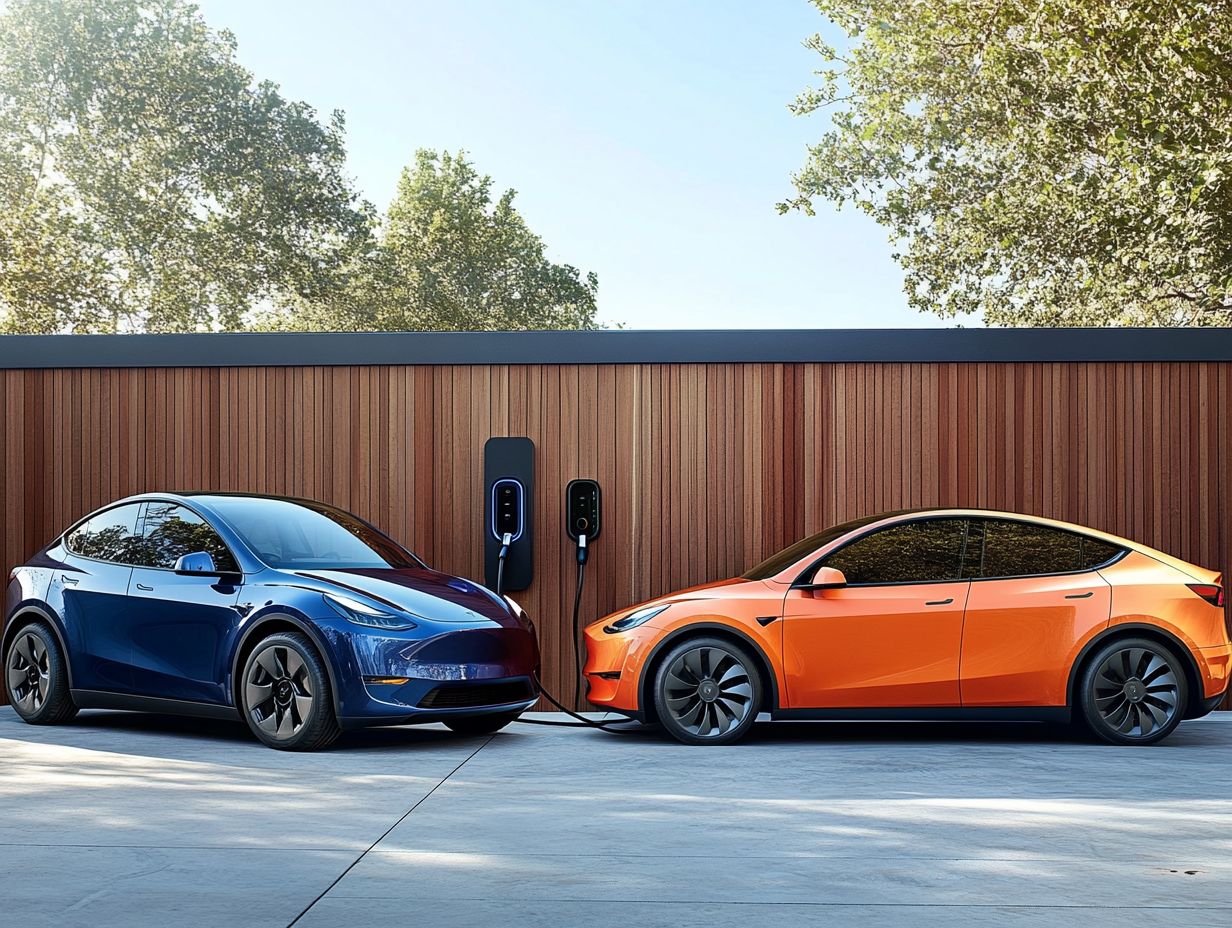
Electric models boast advanced features, including state-of-the-art battery technology and efficient charging infrastructure. These innovations enhance usability and appeal to those seeking eco-friendly alternatives to traditional internal combustion engine vehicles.
Ready to find your perfect electric vehicle? Start your journey today!
Battery Life and Charging Time
Battery life and charging time are paramount for electric vehicle owners. With advancements in battery technology, you now benefit from more efficient rechargeable batteries that significantly minimize downtime at charging stations, such as the convenient JuiceBox Level 2 units.
The performance of your vehicle is closely related to the capacity and health of its battery. Factors like temperature, driving habits, and maintenance practices can influence this.
A well-maintained battery boosts your range and makes acceleration smoother, providing a better driving experience.
Charging times can vary dramatically between different charging stations. For example, Level 2 chargers like JuiceBox deliver a quicker charge compared to standard outlets, enabling you to get back on the road in no time. By embracing these technological advancements, you’ll experience amazing convenience and enjoy longer battery life!
Range and Performance
Range and performance are essential metrics for you when it comes to electric cars, as they directly influence your driving routine. Many potential buyers, like yourself, often express concerns about range anxiety, even with the increasing fuel efficiency of modern electric models.
Your ability to travel longer distances without the hassle of frequent recharging heavily relies on battery capacity, which dictates how much energy can be stored for your use. Alongside battery size, motor efficiency plays a crucial role; a more efficient motor maximizes the stored energy, enhancing both your range and performance.
Technology is evolving rapidly, with innovations such as fast-charging stations and improved battery technologies easing worries surrounding range anxiety. This progress gives you the power to confidently rely on your electric vehicle s capabilities, ensuring that your journeys whether they re short commutes or long road trips can be undertaken with complete peace of mind.
Cost and Maintenance
While the upfront costs of electric vehicles may be higher than those of traditional internal combustion engine models, you ll find that they often lead to considerable savings over time thanks to reduced maintenance expenses and lower fuel costs.
As you weigh these financial shifts, consider the potential savings from charger installations. Also, look at the decrease in energy bills compared to rising gasoline prices.
Electric vehicles typically boast fewer moving parts, which means less wear and tear, allowing for lower maintenance interventions and costs throughout their lifespan.
Additionally, various incentives and tax credits can help ease the initial financial burden, positioning electric cars as not just an environmentally friendly option but also an economically wise choice. For many, this delicate balance between the initial investment and long-term benefits provides a compelling case for embracing electric mobility.
Choosing the Right Electric Model for You
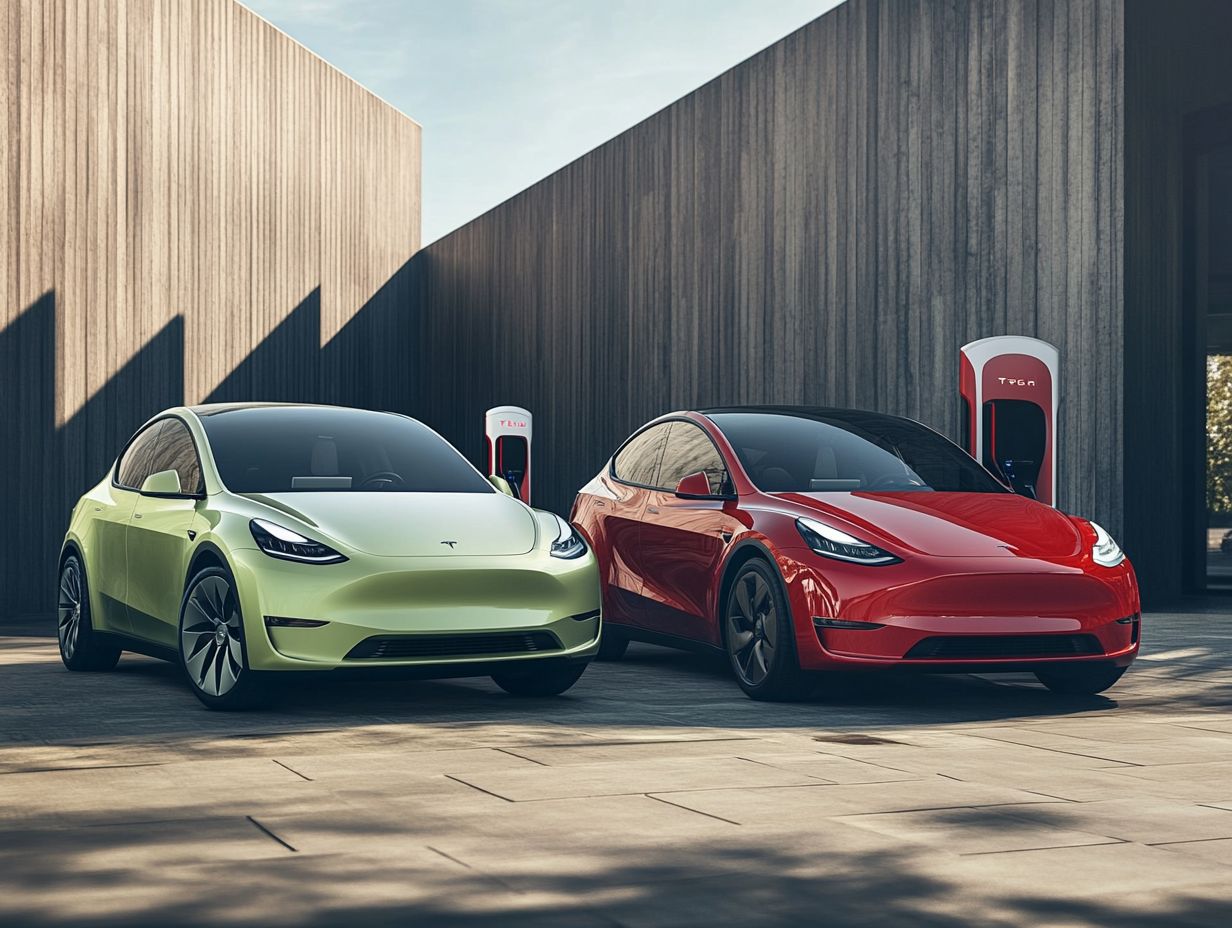
When selecting the right electric model, you must carefully consider several key factors. Reflect on your driving routine, evaluate maintenance expenses, and assess the availability of charging stations. Each element plays a crucial role in determining how well an electric vehicle aligns with your lifestyle.
Considerations for Your Lifestyle and Needs
When you’re evaluating electric vehicles, it’s essential to consider how your driving habits align with the available charging options and the potential maintenance costs tied to various models.
Understanding the distance of your daily commute is crucial, as it directly impacts which electric vehicle will suit your needs best. For example, if you have a longer commute, you should prioritize vehicles that boast greater range capabilities.
The availability of charging stations at home or work is another key factor, significantly influencing how convenient it is to keep your vehicle charged and ready for use. Additionally, don’t overlook the potential savings on maintenance costs; electric models often come with lower expenses due to having fewer moving parts compared to traditional gas-powered vehicles.
Ultimately, your lifestyle and the convenience of charging will play pivotal roles in making an informed decision.
Common Misconceptions about Electric Models
Despite the growing allure of electric vehicles, you may still encounter a range of misconceptions. Concerns about running out of battery power, known as range anxiety, linger, along with the belief that electric vehicles may not be as environmentally friendly as their internal combustion engine counterparts.
Debunking Myths and Addressing Concerns
Addressing the myths surrounding electric vehicles, especially those related to range anxiety and their environmental impact, is essential for informed decision-making.
You may worry that electric vehicles aren’t practical, particularly fearing that you might run out of battery during long journeys. However, advancements in battery technology have dramatically extended the range of modern electric vehicles, with many models now boasting over 300 miles on a single charge. The expanding network of fast-charging stations makes it easy to recharge while on the go.
Another prevalent misconception is that electric vehicles are more harmful to the environment due to the electricity production process. In truth, as renewable energy sources like wind and solar become more common, the carbon footprint associated with charging electric vehicles continues to shrink, making them a more sustainable option than ever before.
Frequently Asked Questions
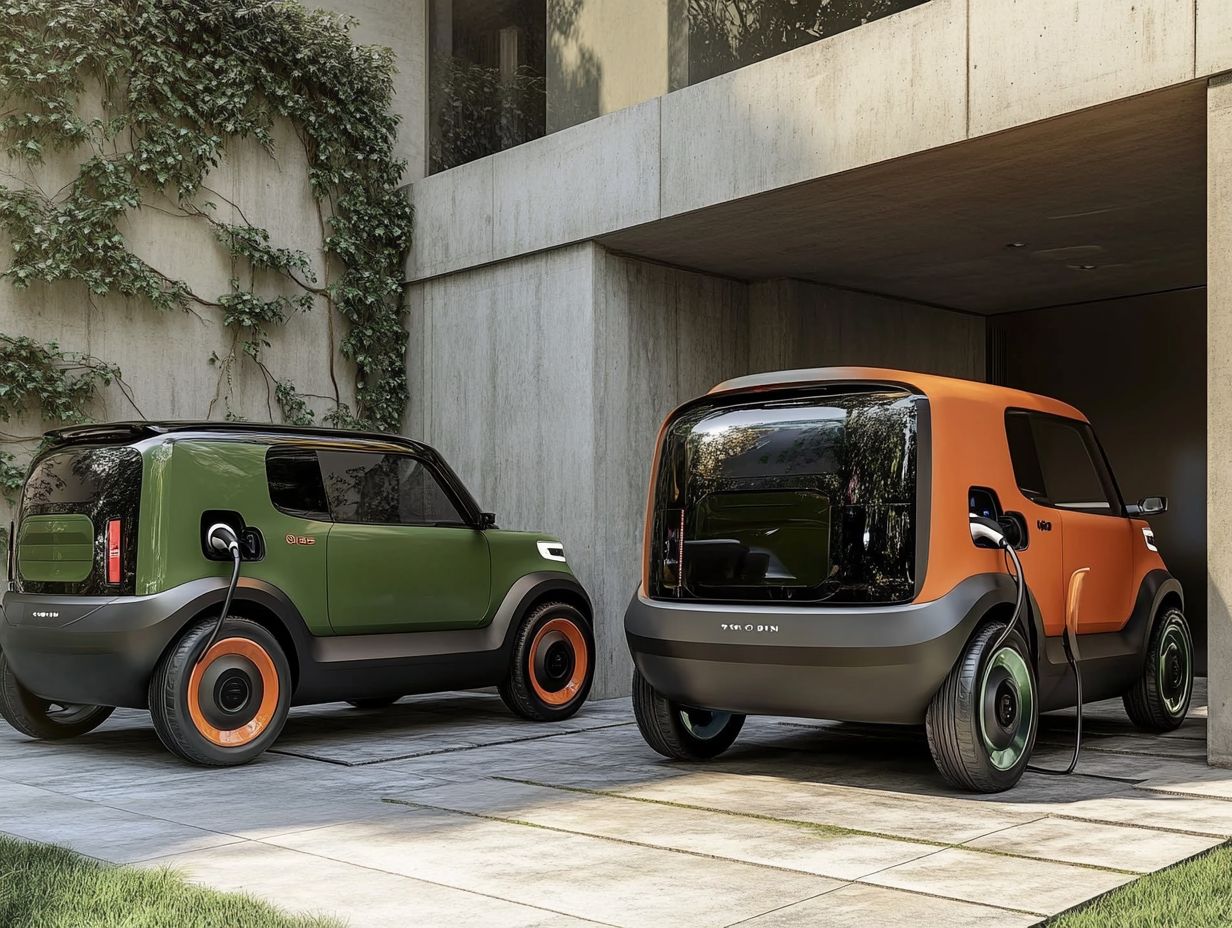
What are electric models?
Electric models refer to vehicles powered by electricity rather than gasoline or diesel. They use an electric motor instead of an internal combustion engine to propel the vehicle.
What are the differences between electric models?
The differences between electric models can vary depending on the specific make and model. Common differences include battery size, range, charging time, and available features such as advanced safety technology or entertainment systems.
How do I understand the feature differences in electric models?
To understand the feature differences in electric models, research and compare different makes and models. Look at specifications such as battery size and range, as well as available features and technology. For a deeper insight, check out understanding feature sensitivity in electric cars. Test driving various models can also help you grasp their unique features.
Do all electric models have the same range and charging time?
No, not all electric models have the same range and charging time. These factors can vary based on the model and type of battery used. Some electric models offer longer ranges and faster charging times than others.
What are the benefits of choosing an electric model over a traditional gasoline vehicle?
- Lower emissions
- Potential cost savings on fuel
- A quieter and smoother driving experience
- Advanced features and technology often not available in traditional vehicles
Are there any downsides to choosing an electric model?
- A higher upfront cost
- Limited charging infrastructure in some areas
- Range anxiety for longer trips
Consider these factors carefully to make the best choice for your needs.
To learn more about electric vehicles, consider visiting a local dealership or checking online resources for additional information.




